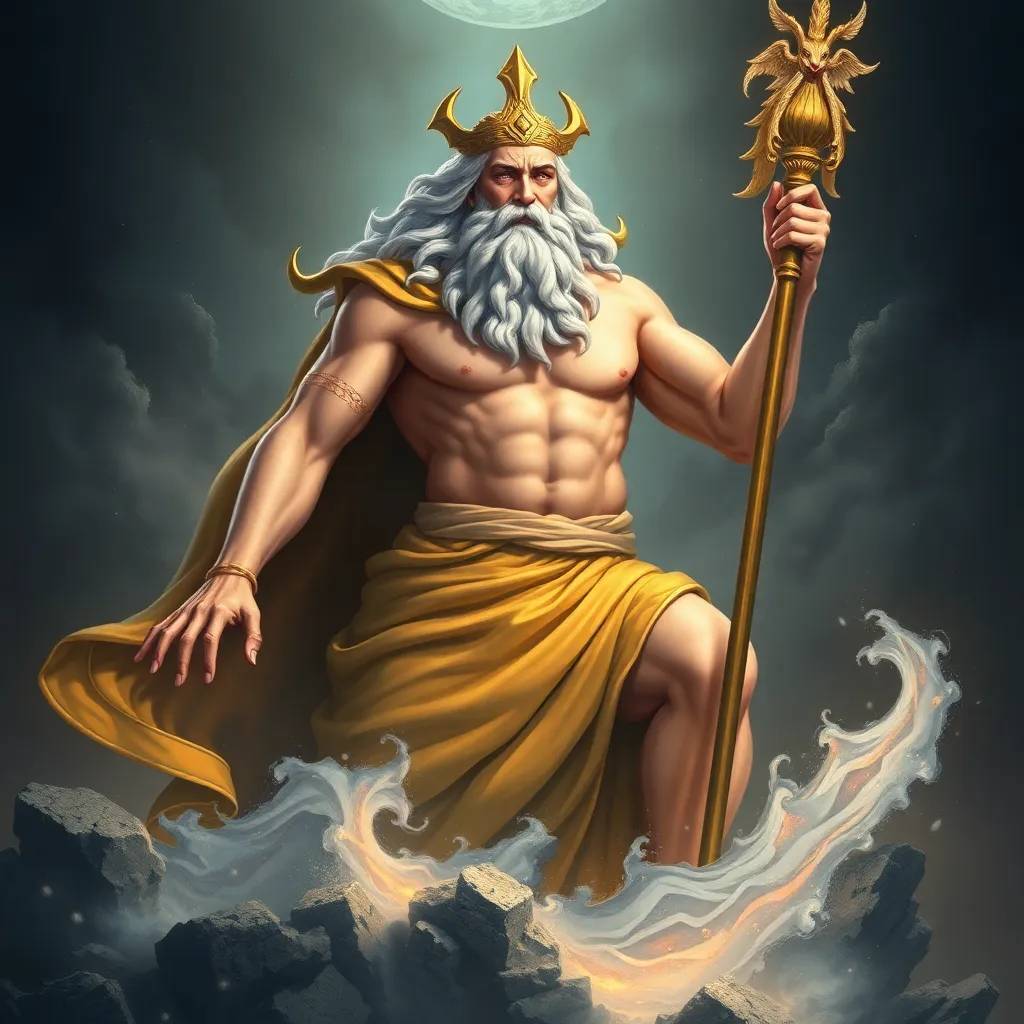Zeus and the Role of Prophecy: How Fate Influenced His Decisions
I. Introduction
Zeus, the king of the gods in Greek mythology, is a figure of immense power and complexity. As the ruler of Mount Olympus, he is often depicted wielding thunderbolts and commanding respect from both deities and mortals. Yet, despite his supreme authority, Zeus’s actions are frequently influenced by prophetic insights, which play a significant role in shaping his decisions.
In ancient Greek culture, prophecy held a central place, serving as a means of divine communication that guided both gods and humans. The messages delivered by oracles were considered sacred and often dictated the course of events. This article explores how prophetic insights shaped Zeus’s actions and decisions in the context of fate, revealing a compelling interplay between his autonomy and the dictates of destiny.
II. The Nature of Zeus: King of the Gods
Zeus is characterized by a multitude of attributes and powers that reinforce his status as the supreme deity. He embodies qualities such as strength, wisdom, justice, and mercy. Often depicted with a regal bearing, he commands the sky, the weather, and the laws governing both gods and mortals.
Within the Greek pantheon, Zeus occupies a unique position. He is the son of Cronus and Rhea and the youngest of his siblings, who include Hestia, Hera, Demeter, Poseidon, and Hades. Following a tumultuous battle known as the Titanomachy, Zeus emerged victorious, overthrowing the Titans and establishing himself as the ruler of Olympus. However, the duality of his role is highlighted by the fact that, despite his power, he too is subject to the whims of fate and prophecy.
III. The Concept of Prophecy in Ancient Greece
Prophecy, in the context of ancient Greece, refers to the foretelling of future events, often conveyed through divine inspiration. It was regarded as a vital tool for understanding the will of the gods. The significance of prophecy cannot be overstated, as it shaped the actions of both mortals and immortals alike.
Several major oracles and seers played pivotal roles in disseminating prophetic wisdom, including:
- Delphi: The most famous oracle, where the Pythia delivered cryptic messages from Apollo.
- Tiresias: A blind seer who possessed the ability to see the future, offering guidance to numerous heroes.
- Dodona: An oracle where priests interpreted the rustling of oak leaves to convey divine messages.
Prophecy served as a guiding force, often dictating the actions and destinies of both gods and mortals, illustrating the intertwined nature of fate and free will in Greek mythology.
IV. Key Prophetic Events in Zeus’s Life
Several pivotal prophetic events significantly influenced Zeus’s life and decisions:
- The Prophecy of Overthrow: A prophecy foretold that Zeus would be overthrown by one of his children, prompting him to take drastic measures to prevent this fate.
- Warning from the Oracles: Prior to the Titanomachy, oracles warned Zeus about the impending battle and the need to gather allies, shaping his strategy for victory.
- Relationships with Other Gods: Prophecies often influenced Zeus’s interactions with other deities, including his choice of consorts and alliances.
These prophetic insights not only guided Zeus’s actions but also added layers of complexity to his relationships with other gods and mortals.
V. Zeus’s Decisions Shaped by Prophecy
Throughout mythology, Zeus made numerous major decisions influenced by prophecies, including:
- Choice of Consort: Fearing the prophecy of being overthrown, Zeus chose to marry Hera, who would bear him children, rather than risk his fate with other potential consorts.
- Handling Mortal Affairs: Zeus often intervened in human affairs based on prophetic insights, guiding heroes such as Perseus and Heracles in their quests.
However, there were moments when Zeus acted contrary to prophetic guidance, leading to significant repercussions:
- Defiance of Fate: In some tales, Zeus attempted to alter the course of events despite warnings, only to face dire consequences.
- Lessons Learned: These decisions often served as cautionary tales, illustrating the futility of resisting fate.
VI. Conflict Between Free Will and Fate
The philosophical debate surrounding fate and free will is a recurring theme in Greek mythology. Zeus, as a powerful deity, often grappled with the tension between his own will and the prophecies that dictated his actions.
Examples of this conflict can be seen in various myths:
- The Tale of Arachne: Despite knowing the consequences of angering Athena, Zeus chose to intervene, showcasing his struggle against fate.
- Heracles and the Twelve Labors: Zeus’s decisions regarding Heracles’s fate were heavily influenced by prophecies, yet he also demonstrated a willingness to alter outcomes.
This intricate navigation between free will and the constraints of prophecy adds depth to Zeus’s character and highlights the overarching theme of destiny in Greek mythology.
VII. The Legacy of Zeus’s Prophetic Journey
The ramifications of Zeus’s actions, as influenced by prophecy, extend beyond his own narrative, impacting future generations of gods and mortals. His reliance on prophetic insights shaped Greek views on fate and divine power, reinforcing the belief that the gods were not only powerful but also bound by a greater cosmic order.
Furthermore, the enduring cultural impact of Zeus’s decisions through the lens of prophecy can be seen in various aspects of literature, art, and philosophy. His journey serves as a reminder of the complex interplay between human agency and divine will, echoing throughout the annals of mythology.
VIII. Conclusion
In conclusion, the relationship between Zeus, prophecy, and fate is a rich tapestry woven throughout Greek mythology. By examining the key prophetic events in his life and the decisions they shaped, we gain insight into the broader implications of prophecy within mythological narratives.
Zeus’s experiences reflect the timeless struggle between free will and destiny, offering valuable lessons about the nature of power, responsibility, and the inexorable pull of fate. As we reflect on these themes, we are reminded of the profound influence that prophecy wielded in the ancient world, shaping not only the lives of the gods but also the very fabric of human existence.




